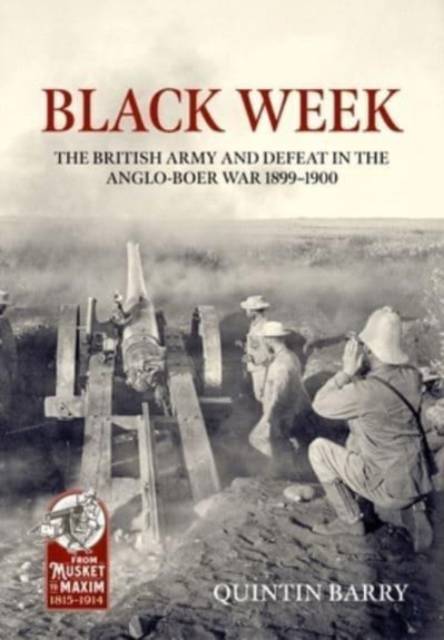
- Retrait gratuit dans votre magasin Club
- 7.000.000 titres dans notre catalogue
- Payer en toute sécurité
- Toujours un magasin près de chez vous
- Retrait gratuit dans votre magasin Club
- 7.000.0000 titres dans notre catalogue
- Payer en toute sécurité
- Toujours un magasin près de chez vous
69,45 €
+ 138 points
Description
In 1899, Britain faced unexpected defeats in the Second Boer War, challenging their confidence and prompting a major military reassessment.
In 1899 few readers of Rudyard Kipling's poem 'The Absent Minded Beggar, ' in which he wrote of 'Fifty thousand horse and foot going to Table Bay, ' could have supposed that this army faced any serious risk of defeat from a handful of Boer farmers. Great Britain was going to war with the Boer Republics in order to assert her supremacy over South Africa, and had mobilised a complete army corps, under General Sir Redvers Buller. This was a force considered to be more than ample to bring about rapid victory.
Yet before year's end, in the space of one week, the British Army had suffered three defeats, at Stormberg, Magersfontein and Colenso. For the British press and public the shock was enormous. The Battle of Colenso in particular destroyed many illusions about the army's military effectiveness, and so far as the government was concerned, confidence in Buller's leadership was shattered. As commander-in-chief in South Africa, it turned to Lord Frederick Roberts, and prepared to overcome the battlefield setbacks by despatching substantial reinforcements.
Before these decisions could take effect, however, the disastrous Battle of Spion Kop had been fought, further exposing the failures in leadership the government, and the British military establishment now faced the task of recovering from these traumatic defeats, as well as discovering the reasons for them. It was not going to be easy. The Second Anglo-Boer War did not end until 1902, by which time the British forces engaged against the Boer Republics had risen tenfold in number. Nor did 'Black Week, ' as those few days in 1899 came to be known, mark the end of military setbacks in South Africa. Many painful lessons had still to be learned about combat with an enemy armed with the most modern weapons before the Boers were finally defeated. These lessons would be learned not only on the field of battle, but also at the tables of the numerous committees established to determine the reason why things had gone so wrong.
In 1899 few readers of Rudyard Kipling's poem 'The Absent Minded Beggar, ' in which he wrote of 'Fifty thousand horse and foot going to Table Bay, ' could have supposed that this army faced any serious risk of defeat from a handful of Boer farmers. Great Britain was going to war with the Boer Republics in order to assert her supremacy over South Africa, and had mobilised a complete army corps, under General Sir Redvers Buller. This was a force considered to be more than ample to bring about rapid victory.
Yet before year's end, in the space of one week, the British Army had suffered three defeats, at Stormberg, Magersfontein and Colenso. For the British press and public the shock was enormous. The Battle of Colenso in particular destroyed many illusions about the army's military effectiveness, and so far as the government was concerned, confidence in Buller's leadership was shattered. As commander-in-chief in South Africa, it turned to Lord Frederick Roberts, and prepared to overcome the battlefield setbacks by despatching substantial reinforcements.
Before these decisions could take effect, however, the disastrous Battle of Spion Kop had been fought, further exposing the failures in leadership the government, and the British military establishment now faced the task of recovering from these traumatic defeats, as well as discovering the reasons for them. It was not going to be easy. The Second Anglo-Boer War did not end until 1902, by which time the British forces engaged against the Boer Republics had risen tenfold in number. Nor did 'Black Week, ' as those few days in 1899 came to be known, mark the end of military setbacks in South Africa. Many painful lessons had still to be learned about combat with an enemy armed with the most modern weapons before the Boers were finally defeated. These lessons would be learned not only on the field of battle, but also at the tables of the numerous committees established to determine the reason why things had gone so wrong.
Spécifications
Parties prenantes
- Auteur(s) :
- Editeur:
Contenu
- Nombre de pages :
- 228
- Langue:
- Anglais
- Collection :
Caractéristiques
- EAN:
- 9781804511862
- Date de parution :
- 30-09-24
- Format:
- Livre relié
- Format numérique:
- Genaaid
- Dimensions :
- 168 mm x 246 mm
- Poids :
- 680 g

Les avis
Nous publions uniquement les avis qui respectent les conditions requises. Consultez nos conditions pour les avis.






